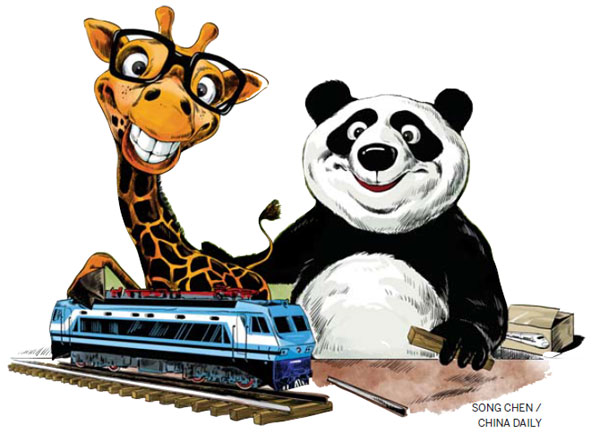Need for rail is not a need for speed


Several Chinese media outlets have erroneously reported that Preimier Li Keqiang had talked about building high-speed railways in Africa. The fact is that, in none of the speeches the premier delivered in the four African countries did he say anything about building high-speed railways. He only said that China's railways and airliners are of high quality, a research and development center for high-speed railway could be set up in Africa, and China had just started work on an electrified (not high-speed) railway connecting Addis Ababa in Ethiopia and Djibouti.
China and Kenya signed a co-financing deal on May 11 to build a railway linking Nairobi to Mombasa, a critical infrastructure project to boost regional trade and deepen integration in East Africa. Interconnection in East Africa and in Africa at large will fundamentally boost economic development of African countries, Li said.
China, no doubt, has the expertise in high-speed railways, but that doesn't necessarily mean it should build high-speed railways in Africa. Instead, it should concentrate on helping African countries build and operate normal-speed railways.
Railways are a prerequisite for a country's or region's economic development, because a train can carry about 2,000 tons of goods or thousands of passengers in a single trip. Railways are to an economy what blood vessels are to a human body. The Unites States, for example, is not only the world's largest economy, but also has the longest railway network, which runs into more than 220,000 kilometers. China's railway network is more than 100,000 km long, including 20,000 km of high-speed railways.
Another country that has benefited immensely from railways is India, which has about 65,000 km of railways. Many believe that the two most important British legacies that India inherited are an effective democratic system and a comprehensive railway network.
The lack of railways is often cited as an important reason for a country's economic backwardness. Ethiopia, for instance, has only one Addis Ababa-Djibouti railway. Although 681 km of that line runs through Ethiopia, media reports say that almost half of it is no longer in use. The agriculturally rich country produces large amounts of high-quality coffee and oilseeds but finds it hard to transport them from plantations to seaports in neighboring countries like Kenya, Djibouti and Eritrea.
As it works with Africa, China could help countries like Ethiopia and Kenya build railways, just as it did in building the Tanzania-Zambia Railway in the 1970s, which is a silent testimony to Sino-African friendship.
China has an excellent record in building railways. The China Railway Construction Corporation has built tens of thousands of kilometers of railways almost without any quality problems. Besides, the competition between CSR and China CNR Corporation, China's two giants that make railway stock, forces them to offer their best products and services to the market.
China-made trains and railway products may not necessarily be the best in the world, but they are relatively cheap and better than most of their competitors in performance-cost ratio. In fact, China's trains have passed the tough test of running in severe climate conditions. Media reports say that when Ethiopian Prime Minister Hailemariam Desalegn asked Li whether China-made trains would suit Africa's conditions, Li said their performance in the tough climates of the Xinjiang Uygur and Tibet autonomous regions prove their quality. This means China-made trains will have no problems running smoothly in Africa.
The building of railways in African countries will boost their economies. A comprehensive railway network could prove beneficial for a country like Ethiopia that produces huge quantities of quality agricultural products.
In building railways, China usually offers only core technology and employs most of the workers from among local residents. So if it is asked to build railways in Africa, China can help create many jobs for locals, which will stimulate consumption. That would once again give the lie to Western propaganda that China is practicing neo-colonialism in Africa.
But building railways in Africa will not be without problems, and continuous flow of funds could be the biggest one. That is why it is important that China concentrates on building normal (as opposed to high-speed) railways in Africa. Moreover, for most countries, especially those in Africa, high-speed railways can become an economic burden.
Also, China needs to carefully select routes to build railways in Africa; it has to conduct (or help conduct) a thorough study on whether a railway line will really boost the economy before embarking on its construction. It should, therefore, concentrate on building railways where there is ample need for freight transport, like concentrated plantations or mining sites, to ensure they run on profits instead of subsidies.
Only this way can railways built by China benefit African countries in a sustainable way.
The author is a professor of transport economics at Beijing Jiaotong University. He talked to Zhang Zhouxiang of China Daily.
(China Daily Africa Weekly 05/16/2014 page15)
Today's Top News
- Trump threatens 10% tariffs on 8 NATO allies
- PLA monitors US naval vessels transiting the Taiwan Strait
- Visit highlights China's importance
- China fortifies energy security as risks rise
- Taiwan separatists warned of action
- Intl students pledge to be cultural links






























